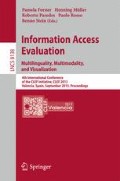Abstract
This paper summarizes the goals, organization, and results of the second RepLab competitive evaluation campaign for Online Reputation Management Systems (RepLab 2013). RepLab focused on the process of monitoring the reputation of companies and individuals, and asked participant systems to annotate different types of information on tweets containing the names of several companies: first tweets had to be classified as related or unrelated to the entity; relevant tweets had to be classified according to their polarity for reputation (Does the content of the tweet have positive or negative implications for the reputation of the entity?), clustered in coherent topics, and clusters had to be ranked according to their priority (potential reputation problems had to come first). The gold standard consists of more than 140,000 tweets annotated by a group of trained annotators supervised and monitored by reputation experts.
This research was partially supported by the European Community’s FP7 Programme under grant agreement n 288024 (LiMoSINe), ESF grant ELIAS, the Spanish Ministry of Education (FPU grant AP2009-0507 and FPI grant BES-2011-044328), the Spanish Ministry of Science and Innovation (Holopedia Project, TIN2010-21128-C02), and the Regional Government of Madrid under MA2VICMR (S2009/TIC-1542).
Access this chapter
Tax calculation will be finalised at checkout
Purchases are for personal use only
Preview
Unable to display preview. Download preview PDF.
References
Amigó, E., Gonzalo, J., Artiles, J., Verdejo, F.: A comparison of extrinsic clustering evaluation metrics based on formal constraints. Information Retrieval 12(4), 461–486 (2009)
Amigó, E., Corujo, A., Gonzalo, J., Meij, E., de Rijke, M.: Overview of RepLab 2012: Evaluating Online Reputation Management Systems. In: CLEF 2012 Labs and Workshop Notebook Papers (2012)
Amigó, E., Gonzalo, J., Artiles, J., Verdejo, F.: Combining evaluation metrics via the unanimous improvement ratio and its application to clustering tasks. Journal of Artificial Intelligence Research 42(1), 689–718 (2011)
Amigó, E., Gonzalo, J., Verdejo, F.: A General Evaluation Measure for Document Organization Tasks. In: Proceedings of SIGIR 2013 (July 2013)
Author information
Authors and Affiliations
Editor information
Editors and Affiliations
Rights and permissions
Copyright information
© 2013 Springer-Verlag Berlin Heidelberg
About this paper
Cite this paper
Amigó, E. et al. (2013). Overview of RepLab 2013: Evaluating Online Reputation Monitoring Systems. In: Forner, P., Müller, H., Paredes, R., Rosso, P., Stein, B. (eds) Information Access Evaluation. Multilinguality, Multimodality, and Visualization. CLEF 2013. Lecture Notes in Computer Science, vol 8138. Springer, Berlin, Heidelberg. https://doi.org/10.1007/978-3-642-40802-1_31
Download citation
DOI: https://doi.org/10.1007/978-3-642-40802-1_31
Publisher Name: Springer, Berlin, Heidelberg
Print ISBN: 978-3-642-40801-4
Online ISBN: 978-3-642-40802-1
eBook Packages: Computer ScienceComputer Science (R0)

